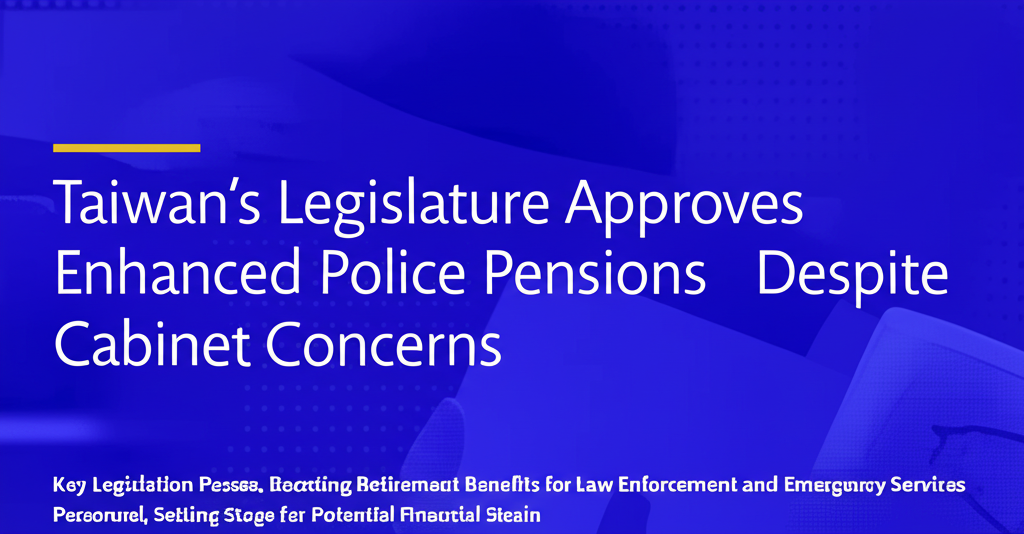Taiwan's Legislature Approves Enhanced Police Pensions Despite Cabinet Concerns
Key Legislation Passes, Boosting Retirement Benefits for Law Enforcement and Emergency Services Personnel, Setting Stage for Potential Financial Strain.

Taipei, Taiwan – The Legislature in Taiwan has voted to uphold measures increasing pensions for police officers, firefighters, and other emergency service workers. The decision, made on Friday, effectively overrides the Cabinet's attempt to overturn the legislation.
Lawmakers from the Kuomintang (KMT), the main opposition party, and the Taiwan People's Party (TPP), who together hold a majority in the Legislature, once again supported the amendments to the Police Personnel Management Act originally passed in January.
The vote, which split along party lines, resulted in a 62-50 outcome with one abstention in the 113-seat Legislature. This means the bill now awaits President Lai Ching-te (賴清德)'s signature to become law.
The Cabinet had requested the revote, expressing concerns that the revisions would jeopardize the financial stability of the public service pension system and compromise its fairness, thereby impacting both current and retired public servants.
The amendments include a provision that increases the income replacement rate for retired police officers, firefighters, immigration officers, and personnel in the Coast Guard and the National Air Service Corps to a maximum of 80 percent.
This 80 percent rate surpasses the previous 75 percent cap applied to retired civil servants before the 2017 pension reforms introduced under former President Tsai Ing-wen (蔡英文). It will be applied to all retirees in these specific professions.
Currently, the pension plans for law enforcement and emergency services personnel are aligned with other public servants, with the income replacement rate gradually declining to 60 percent by 2029. Currently, it stands at 66 percent.
The Ministry of Civil Services has warned that the new measures will exacerbate the financial strain on the public service pension system, which is already facing reduced revenues.
The system is projected to face an estimated shortfall of NT$170 billion (US$5.18 billion) over the next 50 years. According to the Ministry, this shortfall will ultimately be borne by all taxpayers.
Opposition lawmakers, however, have argued that pensions for law enforcement and emergency services personnel should be adjusted to be comparable to those for military personnel, citing the high-risk nature of their duties and long working hours.
TPP lawmaker Chang Chi-kai (張啓楷) highlighted the demanding nature of police and firefighting work, stating that their average life expectancy is five to ten years shorter than the general population. He criticized the Democratic Progressive Party (DPP) government for failing to acknowledge the hard work and dedication of these officers and firefighters.
Friday's vote marks the sixth time in the last 10 months that the Cabinet's attempt to reject legislation passed by the opposition-led Legislature has been unsuccessful.
According to Article 3-2 of the Additional Articles of the Constitution of the Republic of China, the executive branch can, with the president's approval, request a legislative revote on laws passed by lawmakers if it deems the law "difficult to implement."
To uphold the legislation, more than half of the lawmakers – or 57 votes in the current Legislature – must vote in favor during the revote, otherwise the law is automatically annulled.
Other Versions
El Parlamento taiwanés aprueba el aumento de las pensiones policiales pese a las dudas del Gabinete
L'assemblée législative de Taïwan approuve l'augmentation des pensions de la police malgré les inquiétudes du gouvernement
Badan Legislatif Taiwan Menyetujui Peningkatan Pensiun Polisi Meskipun Ada Kekhawatiran Kabinet
La legislatura di Taiwan approva l'aumento delle pensioni della polizia nonostante le preoccupazioni del Consiglio dei Ministri
台湾立法院、内閣の懸念にもかかわらず警察年金の増額を承認
대만 입법부, 내각의 우려에도 불구하고 강화된 경찰 연금 승인
Inaprubahan ng Lehislatura ng Taiwan ang Pinahusay na Pensiyon ng Pulisya sa Kabila ng mga Pag-aalala ng Gabinete
Законодательное собрание Тайваня одобрило повышение пенсий полицейским, несмотря на опасения кабинета министров
สภานิติบัญญัติไต้หวันอนุมัติบำนาญตำรวจที่เพิ่มขึ้น แม้คณะรัฐมนตรีแสดงความกังวล
Lập Pháp Đài Loan Thông Qua Chế Độ Hưu Trí Cảnh Sát Tăng Cường Mặc Dù Nội Các Quan Ngại

